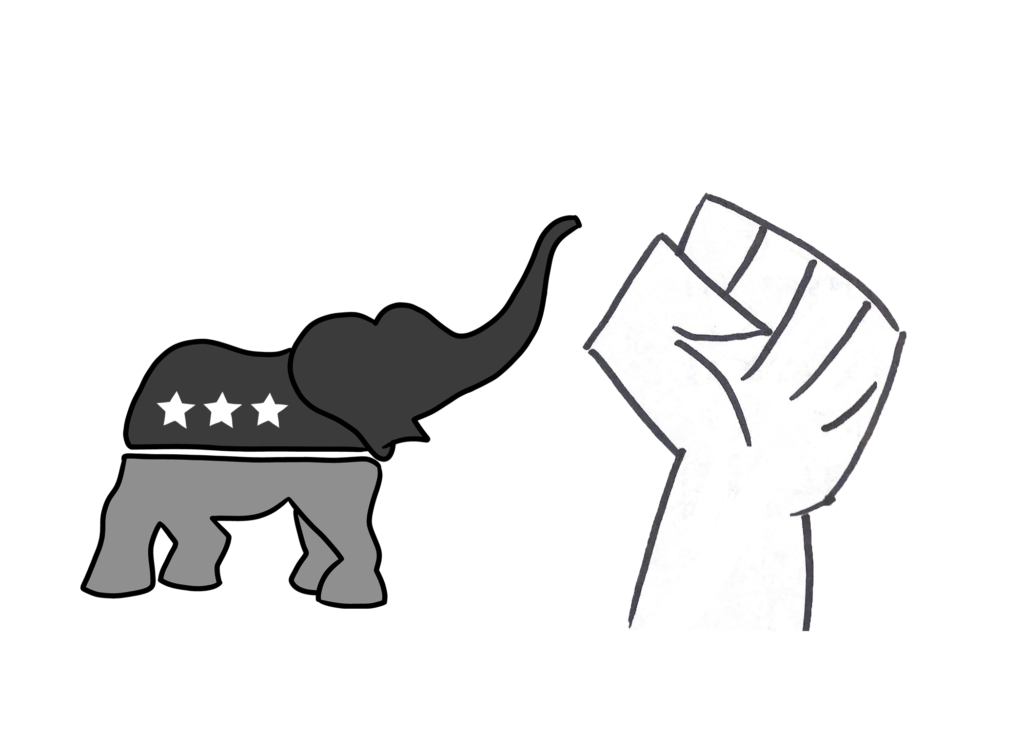In Santa Clara County, where 75.5 percent of voters in the 2020 presidential election voted for Democratic Party candidate Joe Biden, students grow up in a largely blue-dominated area – often surrounded by family and peers with liberal beliefs.
Seniors Ishaan Prasad and Noora Fayad, who are vocal about holding unconventional political opinions, spoke to the Falcon on how their views have affected their interactions and experience with peers.
Prasad is a Middle College student registered in the Class of 2023 but set to graduate this year. He identifies as an independent conservative but said he would register to vote as a Republican due to right-leaning beliefs. Prasad regularly discusses politics with others on platforms such as Instagram and Twitter.
Fayad is a senior whose beliefs and interests in public and foreign policy are shaped by her Palestinian, Lebanese, and Muslim heritage. She identifies as an independent and abolitionist. Although she used to align herself more with the Democratic party, her views shifted toward abolishing the police over the last year. She participates in groups such as Black Lives Matter and the Anti-Police Terror Project in Oakland.
Prasad: proud to be conservative
Q: What are your experiences of expressing unconventional opinions in Saratoga?
Prasad: I grew up a Democrat, like many others, without understanding what that meant. My shift to conservatism spurred towards the end of my freshman year. Through the 2020 presidential election, I supported Joe Biden as a candidate, going as far as taking to social media to argue with Trump supporters, until my mom asked me a critical question, “Why do you support Biden?” I was a little stunned. I didn’t have an actual answer besides “He’s not Trump.” I think the first conservative influencer I ever watched was Candace Owens. I don’t even remember what it was about, but I remember being taken aback by how calm and collected she was. She didn’t need to yell or accuse people to convey her argument; she just said it. As I exposed myself to more and more conservative voices, I concluded: on 90% of actual issues, Democrats and Republicans agree on their existence; they only disagree on the best possible solution.
My experiences since shifting political ideologies have been mixed, to say the least. I find that a lot of people try to attack me online for my political views, but aren’t willing to engage in genuine discussion. I don’t have a problem with left-leaning individuals, I have a problem with people who make blanket statements about their political affiliations, but are so uninvolved that they can’t defend their beliefs. When I started being more public about my political views, I found that a lot of people came out of the woodwork and admitted to being conservative or right-leaning as well, they just never mentioned it because of how much attention it would attract.
Q: How do you think living in Saratoga has influenced your political opinions?
Prasad: Being uninvolved or not knowledgeable politically, but avidly left-leaning, to the point where they will target people who stray from typical Democrat discourse. I don’t necessarily blame them for this, I did it too. On another note, I have convinced a few people of my political views who were previously left-leaning. What I encourage is genuine discussions, not senseless and biased pushback. In Saratoga specifically, I find that most people who openly admit to being conservative are equally expressive online or in real life, simply because they were passionate enough to risk criticism and admit their affiliations publicly. This disparity is only worsened with how watered-down political discussion is nowadays. Often, you don’t even have to be original to make a statement, all you have to do is put a bright and colorful Instagram post on your story and you can call yourself a “social justice warrior.”
Q: Do you feel judged or silenced by your peers for certain beliefs you may have?
Prasad: Recently a former Saratoga High student messaged me responding to my analysis of changes to the local curriculum and how they would exacerbate racial tensions rather than resolve them. All they cared to message me was “bro shut up pls and thank you,” which was honestly laughable. I’d be lying if I said I hadn’t lost friends over my political openness.
Q: How do you think the school’s environment helps or hinders your expression of political ideas?
Prasad: It’s not a secret that Saratoga schools are far from apolitical. Until recently, I never had an openly right-leaning teacher, and despite district policies that prohibit instructors from discussing politics outside of an academic scope, any student can attest to how little it obeyed. Socially, left-leaning individuals do not need to fear a negative response for their political voice, but right-leaning individuals do. Teachers aren’t immune to this. Given the economic state of California and the salaries of teachers, it’s unsurprising that many are Democrats, but those that aren’t are often unwilling to admit it for fear of social or professional consequences. As I mentioned, growing up in Saratoga undoubtedly biases your political views. Left-leaning teachers who are often children’s first exposure to politics will shape the course of their discovery.
Q: How do you think Saratoga can improve and become more inclusive of people’s opinions?
Prasad: I am a huge proponent of California splitting their electoral votes the way that Maine and Nebraska do. Right now, half of California feels uninvolved in politics because they know that their vote won’t affect elections. Recently, my mom launched a Twitter movement called #lexit, or the “liberal exit,” encouraging California conservatives to speak out. People will become more accepting of conservatives as more conservatives become more aggressive in defending their views. I always encourage people on either side of the aisle to engage in real discussions. We do have structural opportunities for change, but in general, change will come as more people are brave enough to speak out.
Student’s advocacy perseveres through strong criticism
Q: What are your experiences of expressing unconventional opinions in Saratoga?
Fayad: While Saratoga has relatively more Democrats, there are quite some Republicans as well. I find myself more accepted by Democrats than by Republicans. Democrats tend to see me as more left than progressives like AOC and Bernie. They sometimes call me “extreme,” because of my viewpoints, such as abolishing the police system. For example, right now Democrats control the White House, Congress, and Senate … And nothing is substantially getting done to end systemic problems. Honestly, I think some disagree but a vast majority of people (that I know) share the same beliefs as their parents.
Q: How do you think living in Saratoga has influenced your political opinions?
Fayad: Living in Saratoga did not influence my views substantially. My background being Palestinian and Lebanese shaped my views entirely. I would be that girl in middle school speaking about Eric Garner and everyone would look at me weirdly and say, ‘Why are you always talking about the bad stuff?’ Saratoga was not all that welcoming to my viewpoints because a lot of them are rich and upper class and their children are raised with privilege so they can’t see anything else happening in the world because they are blinded by money and that same privilege. I do not like to pick sides and close myself to being a Democrat or Republican … I find it difficult to make the change that is needed to be seen in the world by restricting yourself to one group or idea.
Q: What beliefs do you hold that may be deemed controversial?
Fayad: I firmly believe in abolishing the police system and creating an entirely new one that has no history of slave catchers. Defunding the police and reallocating funds is great, but we can do better and we can do more to save lives.
Q: Do you ever have trouble finding a space to voice your opinions?
Fayad: Yes! People tend to assume that I am some radical with crazy ideas. For example, people think that it is crazy to reformat and change the government and its institutions. It quite literally says in the U.S. constitution that you can legally do that “that to secure these rights, governments are instituted among men, deriving their just oilers from the consent of the governed, that whenever any form of government becomes destructive of these ends, it is the right of the people to alter or to abolish it, and to institute new government, laying its foundation on. When the government is not working for the people, the people have THE RIGHT to ‘abolish it.’
Q: Do you feel judged or silenced by your peers for certain beliefs you may have?
Fayad: Before, I used to align myself more with the Democrat party because I fell into the trap of ‘well, they are better than Republicans.’ Within the past year and a half, I have realized that more and more that I criticize the Democrat party as much as the Republican party. They are so busy fighting each other that they cannot get anything done. So yes, when I speak about and criticize the Democrat party. I face hate and judgment. But I still say it anyway, because no matter what, I hope that people think about what I have to say as a woman of color and how that has shaped my beliefs.
Q: How do peers and friends react to your political ideology?
Fayad: They have that negative “oh” effect. I have so many friends who are POC and BIPOC who say that they are Democrats because they are “better than Republicans.” And I always tell them, why settle for less than what you deserve? In some ways, my beliefs have impacted my social life. I have lost friends to my beliefs, even Democrats. But I am not bothered by it.
Q: How do you think the school’s environment helps or hinders your expression of political ideas?
Fayad: Well, the school itself, in my opinion, does not have any space to discuss politics in its raw form. Yes, we have a social justice club but that still does not discuss what needs to be discussed, such as government at its core. When I say government, I mean how our political system is failing the people. And how performance activism has engulfed and taken over our world. I am a huge supporter of teachers expressing their beliefs and not discriminating against students that have different beliefs. I do have teachers that speak to me about politics. And honestly just knowing that they support POC and our LGBTQ community is just so supportive.
Q: How do you think Saratoga can improve and become more inclusive of people’s opinions?
Fayad: I think the best way for Saratoga to be inclusive of all opinions is to simply not judge because everyone has different opinions based on where they come from, their personal experiences, and how they grew up. Simply put, don’t judge people because you do not know where they came from or their experiences, or anything really about them. You can try to understand why they believe in such ideas and talk to them about them simultaneously without passing judgment.



























